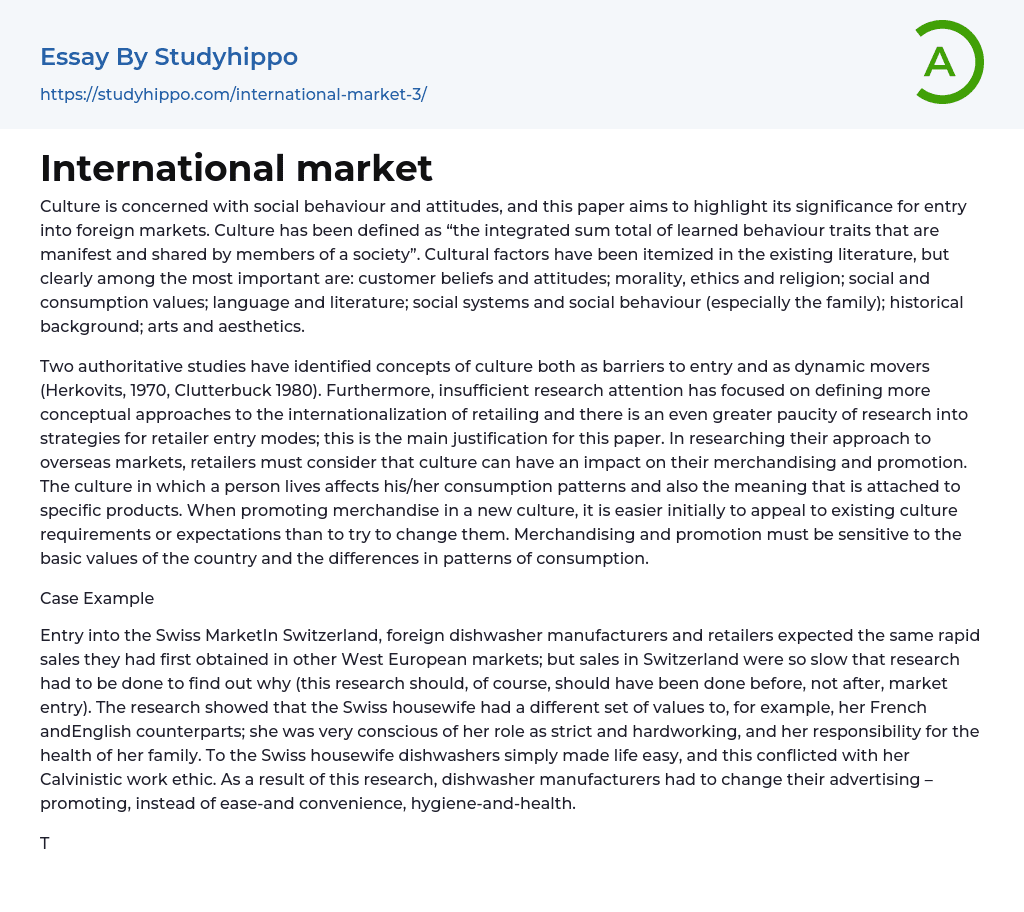This paper focuses on the importance of culture for entering foreign markets. Culture involves social behavior and attitudes. It is defined as the combined and shared learned behavior traits of a society's members. The existing literature has listed various cultural factors, including customer beliefs and attitudes, morality, ethics and religion, social and consumption values, language and literature, social systems and behavior (particularly family dynamics), historical background, and arts and aesthetics.
There are two authoritative studies that have identified culture as both barriers to entry and dynamic movers (Herkovits, 1970, Clutterbuck 1980). However, there has been insufficient research focused on defining more conceptual approaches to internationalizing retailing and an even greater lack of research on strategies for retailer entry modes. This paper aims to address this gap in knowledge. Retailers need to consider the impact of culture on the
...ir merchandising and promotion when expanding into overseas markets. The culture in which people live affects their consumption patterns and the meaning attached to specific products. Rather than attempting to change cultural expectations, it is easier for retailers to initially appeal to existing culture requirements when promoting merchandise in a new culture. Merchandising and promotion strategies must be sensitive to the basic values of the country and the differences in consumption patterns.
Case Example
Entry into the Swiss Market
In Switzerland, foreign dishwasher manufacturers and retailers anticipated swift sales similar to what they experienced in other Western European markets. However, sales in Switzerland were unexpectedly slow. To understand the reason behind this disparity, research was conducted after the market entry, although it would have been more prudent to conduct it prior to entry. The research revealed tha
Swiss housewives held different values compared to their French and English counterparts. They strongly identified with their role as strict and hardworking individuals responsible for their family's health. Dishwashers, in their view, simply facilitated an easier life, which conflicted with their Calvinistic work ethic. Consequently, dishwasher manufacturers needed to revise their advertising strategy, shifting the focus from convenience and simplicity to hygiene and health.
They emphasized that dishwashers, which use higher temperatures than hand washing, provide a more hygienic cleaning process. As a result, automatic dishwashers were easily sold in Switzerland. Source: Author Cultures across countries High context culture – meaning of behavior and speech varies depending on the situation – nonverbal cues convey significant meaning (Read between the lines) – e.g. Saudi Arabia and Japan; written contracts may not always be enforced when new executives come in (Chile, Mexico) Low context culture – intentions are expressed verbally – situation does not alter the meaning of words – e.g.
India, China, Australia, and New Zealand Cultural Assessment
International retailers must effectively communicate messages to individuals from diverse cultures in order to successfully promote their products in foreign markets. Cultural differences can lead to misunderstandings, which can significantly harm a company's or product's reputation. To ensure that the intended message is received accurately, retailers must have a thorough understanding of how each element of the message is perceived in the foreign culture. Failing to adapt to national customs and establish a connection with the target market will result in ineffective market entry strategies. The importance of clear communication is such that any potential for cultural misunderstandings should be eliminated. It is crucial for companies to identify key management positions
and prioritize appointing individuals from the respective culture whenever possible.
Many companies make the error of appointing employees from their parent companies to key positions in their foreign subsidiaries, often based solely on their language fluency. In order to comprehend the most significant aspects of a foreign culture, companies must remain vigilant and maintain a balance. There is no single approach to evaluate other cultures for retail purposes, as the evaluation method should be dictated by the type of products being offered. Retailers must possess perceptiveness and avoid exaggerating the differences or similarities between the foreign culture and their own. For instance, when analyzing the American market, a British retailer might overemphasize a perceived shared culture due to the shared language and close political and economic ties.
"A common language cannot indefinitely guarantee a common culture when the geographical, political, and economic factors that shape the culture are no longer uniform across its entire area," states the text. The example of Marks and Spencer pulling out of the Canadian market in 1999 illustrates this idea. The company believed that a shared cultural affinity would make Canadian consumers more receptive to the St Michael brand name, but this was not the case. In other words, just because two regions share a common language or heritage does not mean they will have a shared culture. Another complicating factor in understanding a country's culture is the presence of multiple cultures or sub-cultures within many nations worldwide.
- Perseverance essays
- Expressive essays
- Character Traits essays
- Apology essays
- Compassion essays
- Adult essays
- Aggression essays
- Altruism essays
- Archetype essays
- Behavior essays
- Certainty essays
- Conformity essays
- Deception essays
- Human Behavior essays
- Human Sexuality essays
- Maturity essays
- Morality essays
- Obedience essays
- Procrastination essays
- Reinforcement essays
- Role Model essays
- Activism essays
- Communism essays
- Conservatism essays
- Liberalism essays
- Marxism essays
- Nationalism essays
- Patriotism essays
- Policy essays
- Public Policy essays
- Social Contract essays
- Socialism essays
- Totalitarianism essays
- Coaching essays
- Critical Thinking essays
- homework essays
- Learning essays
- Library essays
- Listening essays
- Literacy essays
- Mentor essays
- Physical Education essays
- Project essays
- Reading essays
- Research essays
- Sex Education essays
- Social Studies essays
- Standardized Testing essays
- Study Plan essays
- Teaching essays




